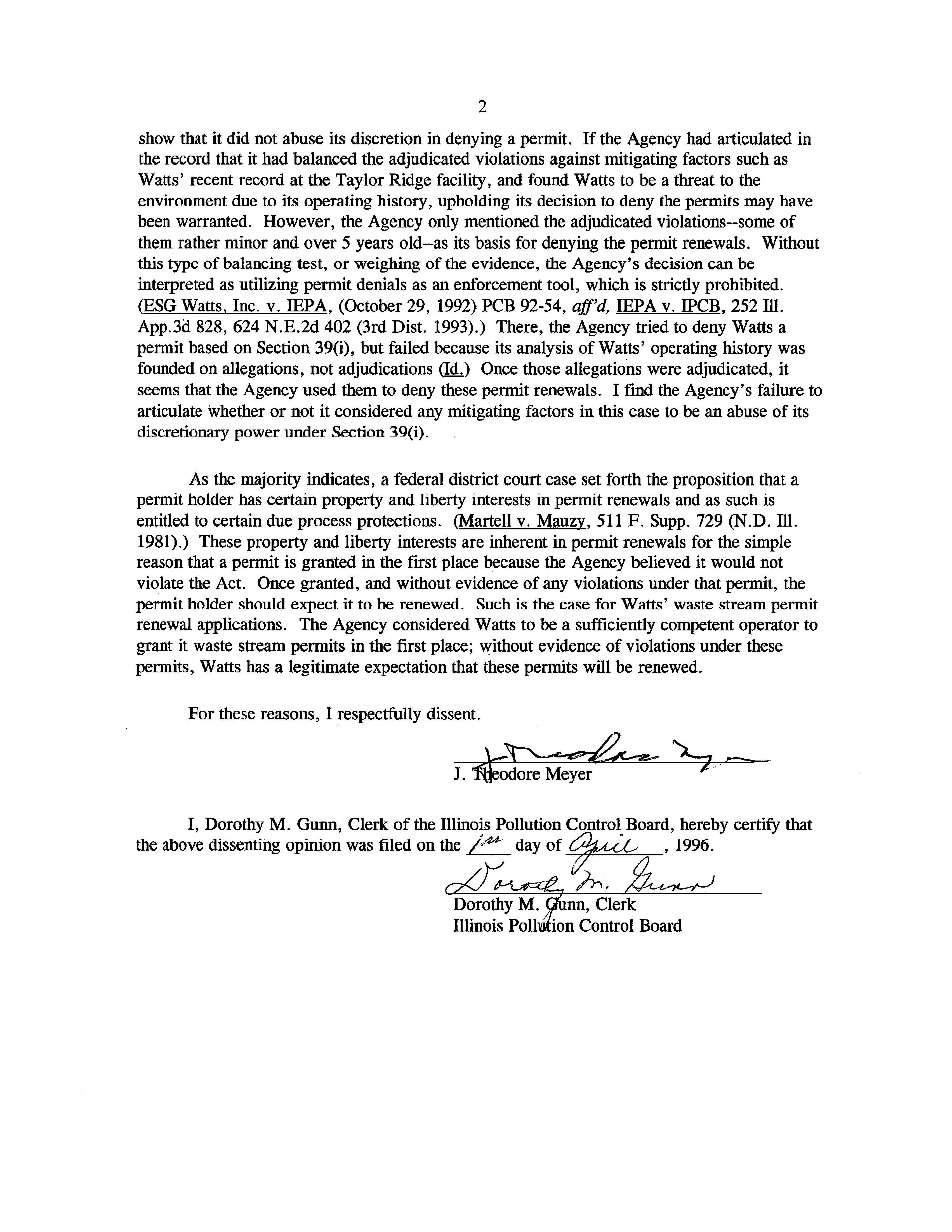ILLINOIS POLLUTION CONTROL BOARD
March 21,
1996
ESG WATTS,
INC,
an Iowa Corporation,
)
)
PCB 94-243
Petitioner,
)
94-306
)
94-307
)
94-308
)
94-309
ILLINOIS ENVIRONMENTAL
)
95-133
PROTECTION AGENCY,
)
95-134
)
(Consolidate)
Respondent.
)
(Permit Appeal
-
Land)
DISSENTING
OPINION
(by
J.
Theodore Meyer):
I agree that the standard of review for an Illinois Environmental Protection Agency
(Agency) decision to deny a permit renewal under Section
39(i)
is less
stringent thanthe
arbitrary and capricious standard espoused by the parties in this matter. For denials based on
Section
39(i)
the Board must review not only the operating history of the permit applicant, but
also the Agency’s analysis of such history to determine whether or not the Agency abused its
discretion in denying the permit.
However, I disagree with the majority’s
analysis which
found that the Agency did not abuse
its discretion in denying ESG Watts (Watts) its permit
renewals.
In explaining its decision to deny Watts’ permits, the Agency stated that it looked at
Watts’ history
“in the aggregate”.
(Transcript at 62-65.)
The Agency never fully explained
this analysis.
Watts has an operating history
which includes a civil penalty of $350,000 for
violations of landfill regulations
at its
Sangamon County landfill, and
19 administrative
citations over a period of 10 years.
These are not mere allegations and therefore can be
legitimately~
considered in an analysis of an operator’s history.
However,
Watts’ operating
history does not consist ofthese facts alone.
There are factors
in mitigation to
consider,
including those set forth in Section
745.141(b)
of the Act,
as mentioned in the majority
opinion.
For six years,
Watts operated the Taylor Ridge facility, the landfill at issue in this case,
without incurring any violations and despite having endured 32 Agency inspections.
In
addition,
the permit renewals at issue
all involve waste stream permits,
none ofwhich
have
been found in
violation ofthe Act or Board regulations.
In fact, none ofthe prior
adjudications against Watts involved
waste streampermit violations.
Section 39
(i)
allows for a great amount of discretion on the part of the Agency.
As
a
result, the Agency must explain as fully as possible its bases for denial under this
section to
2
show that it did not abuse its discretion in denying a permit.
If the Agency had articulated in
the record that it had balanced the adjudicated violations against mitigating factors
such as
Watts’ recent record at the Taylor Ridge facility, and found Watts to
be a threat to the
environment due to
its operating history,
upholding its decision to deny the permits may have
been warranted.
However, the Agency only mentioned the adjudicated violations--some of
them rather minor and over 5 years old--as its basis for denying the permit renewals.
Without
this typc of balancing test, or weighing ofthe evidence, the Agency’s decision can be
interpreted
as utilizing permit denials as an enforcement tool, which is
strictly prohibited.
(ESO Watts. Inc.
v. IEPA, (October 29,
1992) PCB
92-54, aff’d,
IEPA v.
IPCB,
252
Ill.
App.3d 828,
624
N.E.2d 402 (3rd Dist.
1993).)
There, the Agency tried to deny Watts a
permit based on Section 39(i), but failed because its
analysis ofWatts’ operating history was
founded on allegations, not adjudications Q4~.)Once those allegations were adjudicated, it
seems that the Agency used them to deny these permit renewals.
I find the Agency’s failure to
articulate whether or not it considered any mitigating factors in this case to
be an abuse of its
discretionary power under Section
39(i).
As the majority indicates,
a federal district court case
set forth the proposition that a
permit holder has certain property and liberty
interests in permit renewals
and as such is
entitled to certain due
process protections.
(Martell v. Mauzv,
511
F.
Supp.
729
(N.D.
Ill.
1981).)
These property and liberty interests are inherent in permit renewals for the simple
reason that a permit is granted in the first place because the
Agency believed it would not
violate the Act.
Once granted, and without evidence of any violations under that permit, the
permit holder should expect
it
to be
renewed
Such is the case for Watts’ waste
stream. permit
renewal applications.
The Agency considered Watts to be a sufficiently competent operator to
grant it waste
stream permits
in the
first place; without evidence of violations under these
permits, Watts has a legitimate expectation that these permits will be renewed.
For these reasons, I respectfully dissent.
J. t~jeodore
Meyer
I, Dorothy M. Gunn, Clerk of the Illinois Pollution Control Board, hereby certify that
the above dissenting opinion was
filed on the
/‘~
day of
,
1996.
‘V
~
Dorothy M. ~unn,
Clerk
Illinois Polltion
Control Board


